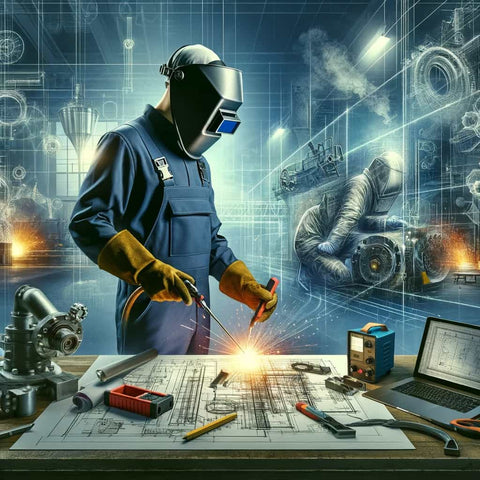
A welding engineer is someone who knows everything about welding, from designing processes to making sure the final welds are strong and safe.
They’re the experts behind big projects in construction, manufacturing, and more. In this article, you’ll learn what a welding engineer does, the skills they need, and how they make a difference in important industries.
Whether you’re new to the topic or want to learn more, this article breaks it down in a simple, clear way. Keep reading to discover what makes this career so interesting and why it’s so important!
Key Takeaways
- Welding engineers specialize in the design, development, and implementation of welding processes and systems.
- They play a critical role in ensuring the safety, reliability, and efficiency of various industrial applications.
- Welding engineers work to develop and improve welding techniques, equipment, and materials, oversee welding operations, troubleshoot issues, and ensure compliance with safety standards and regulations.
What is a Welding Engineer?
A welding engineer designs and oversees welding processes to ensure they are safe, efficient, and meet quality standards. They work with materials like metals, plastics, and composites to create products that meet specific needs.
Their job includes analyzing welding techniques, testing materials, and following industry regulations.
Welding engineers also collaborate with other engineers and technicians, train workers in welding methods, and solve issues during production.
They play a key role in manufacturing, ensuring products are made safely, efficiently, and with high quality, making them essential to many industries.
What Does a Welding Engineer Do?

As a welding engineer, you are responsible for overseeing the welding process in various industries. Your primary role is to ensure that the welding process is efficient, safe, and meets the required standards. Here are some of the things that you will be doing as a welding engineer:
-
Designing welding procedures: You will be responsible for designing the welding procedures that will be used in the manufacturing process. This will involve selecting the appropriate welding techniques, equipment, and materials.
-
Testing and evaluating welds: You will be responsible for testing and evaluating the welds to ensure that they meet the required standards. This will involve using various testing methods such as x-rays, ultrasonic testing, and visual inspection.
-
Developing welding standards: You will be responsible for developing welding standards that will be used in the manufacturing process. This will involve working with other engineers and industry experts to develop standards that are safe, efficient, and cost-effective.
-
Training and supervising welders: You will be responsible for training and supervising welders to ensure that they are following the welding procedures and standards. This will involve providing guidance, feedback, and support to welders to help them improve their skills.
-
Troubleshooting welding problems: You will be responsible for troubleshooting welding problems and finding solutions to ensure that the welding process is running smoothly. This will involve working with other engineers and industry experts to identify and resolve welding problems.
Overall, as a welding engineer, you will play a critical role in ensuring that the welding process is efficient, safe, and meets the required standards. Your expertise will be essential in various industries such as manufacturing, construction, and aerospace.
How to Become a Welding Engineer?
Becoming a welding engineer requires a combination of education, training, and experience. Here are some ways you can become a welding engineer:
1. Obtain a Bachelor's Degree
The first step to becoming a welding engineer is to earn a bachelor's degree in welding engineering or a related field such as mechanical engineering, materials engineering, or metallurgical engineering. A degree in welding engineering will provide you with a strong foundation in welding processes, materials, and design.
2. Gain Work Experience
After completing your degree, gaining work experience is crucial to becoming a welding engineer. Look for entry-level positions in welding or engineering firms to gain practical experience in the field. This will help you develop your skills and knowledge of welding processes and materials.
3. Obtain Professional Certification
Obtaining professional certification can help you stand out in the job market and demonstrate your expertise in welding engineering. The American Welding Society (AWS) offers several certifications for welding professionals, including the Certified Welding Engineer (CWE) certification.
4. Continue Your Education
Continuing education is important in any engineering field, including welding engineering. Consider pursuing a master's degree or other advanced degrees in welding engineering or related fields to further develop your skills and knowledge.
By following these steps, you can become a skilled welding engineer with the knowledge and expertise to design and implement welding processes for a variety of applications.
Salary of Welding Engineer in 2025

As a welding engineer, your salary is determined by factors such as your level of education, experience, and location. In 2025, the average salary for a welding engineer is expected to be around $75,000 to $95,000 per year.
The salary range for a welding engineer varies depending on the industry you work in. For example, those in the aerospace and defense industry tend to earn more than those in the manufacturing industry. Additionally, welding engineers who work in larger cities tend to earn more than those in smaller towns.
In addition to your base salary, you may also receive bonuses or other forms of compensation. For example, some companies offer profit-sharing programs or stock options as part of their compensation packages.
Overall, the salary of a welding engineer is competitive and offers opportunities for growth and advancement. With the demand for skilled professionals in the field, there is potential for higher salaries as well.
Careers Opportunities in Welding Engineering
As a welding engineer, you have a wide range of career opportunities available to you. Here are some of the most popular careers in welding engineering:
-
Welding Engineer: This is the most common career for welding engineers. Welding engineers work in a variety of industries, including aerospace, automotive, construction, and manufacturing. They are responsible for designing and implementing welding processes, developing welding procedures, and ensuring the quality of welded products.
-
Welding Inspector: Welding inspectors are responsible for ensuring that welded products meet industry standards and specifications. They inspect welding work and materials to ensure that they meet quality standards and that they are free from defects.
-
Materials Engineer: Materials engineers work with welding engineers to develop new welding processes and materials. They are responsible for researching and developing new materials that can be welded, and for identifying the best welding processes for specific materials.
-
Quality Control Engineer: Quality control engineers are responsible for ensuring that welded products meet quality standards. They work with welding engineers to develop quality control processes and procedures, and they monitor the welding process to ensure that products are free from defects.
Benefits of Becoming a Welding Engineer
There are many benefits to pursuing a career in welding engineering. Here are some of the most significant benefits:
-
High Demand: Welding engineers are in high demand in many industries, including aerospace, automotive, construction, and manufacturing. This demand is expected to continue to grow in the coming years, which means that there will be plenty of job opportunities for welding engineers.
-
High Salary: Welding engineers typically earn high salaries, with the average salary for a welding engineer ranging from $60,000 to $100,000 per year. This salary can be even higher for welding engineers who work in specialized industries or who have extensive experience.
-
Career Growth: Welding engineers have many opportunities for career growth and advancement. They can move into management positions, become experts in specific welding processes or materials, or even start their own businesses.
Pursuing a career in welding engineering can be a smart choice for anyone who is interested in engineering, manufacturing, or construction.
With high demand, high salaries, and plenty of opportunities for career growth, welding engineering is a field that offers many benefits and opportunities.
The Importance of Welding Engineers for Industry Applications
Welding engineers are vital for ensuring safe, high-quality welding processes across industries. They optimize techniques, equipment, and materials to meet industry standards while improving efficiency and reducing costs.
- Construction: Welding engineers maintain structural integrity in buildings, bridges, and infrastructure by selecting proper materials and techniques.
- Manufacturing: They design welding processes for machinery and vehicles, ensuring product quality and streamlined production.
- Automotive & Aerospace: Engineers ensure safety and performance in vehicles and aircraft by optimizing lightweight, reliable welding methods.
- Energy: They oversee welding for pipelines, turbines, and boilers to meet strict safety and efficiency standards.
Welding engineers ensure safe, reliable products in every industry they serve.
Conclusion
In conclusion, welding engineers play a key role in the manufacturing industry by ensuring the quality and safety of welded products. They design welding procedures, supervise operations, and solve problems to meet high standards.
A welding engineer needs a strong background in welding technology, materials, and engineering, along with knowledge of welding codes and standards.
Welding engineers work in industries like automotive, aerospace, construction, and oil and gas, using their skills to create safe and reliable products.
Ready to explore welding? Check out our Beginner’s MIG Welders or TIG Welders to get started!
Frequently Asked Questions About Welding Engineer
What is the role of a welding engineer?
A welding engineer is responsible for designing, developing, and implementing welding processes and procedures. They work with a variety of materials, including metals, plastics, and composites, to create products that meet specific performance and quality standards.
What is the difference between a welder and a welding engineer?
A welder is a skilled tradesperson who performs welding operations, including cutting, joining, and shaping metal parts. A welding engineer, on the other hand, is responsible for overseeing the entire welding process, from design to implementation. They use their knowledge of materials science, metallurgy, and welding techniques to develop welding procedures that meet specific performance and quality standards.
What is the difference between welding engineer and a welding inspector?
While both welding engineers and welding inspectors are involved in the welding process, their roles are quite different. A welding engineer is responsible for designing and developing welding procedures, while a welding inspector is responsible for ensuring that those procedures are followed correctly. Welding inspectors inspect welds to ensure that they meet industry standards and regulations.
Is welding engineering a good career?
Yes, welding engineering can be a rewarding and lucrative career. Welding engineers are in high demand in a variety of industries, including aerospace, automotive, and construction. They typically have a strong background in materials science, metallurgy, and welding techniques, and are skilled at problem-solving and critical thinking. Welding engineering can offer a challenging and rewarding career path for those who are interested in the field.
